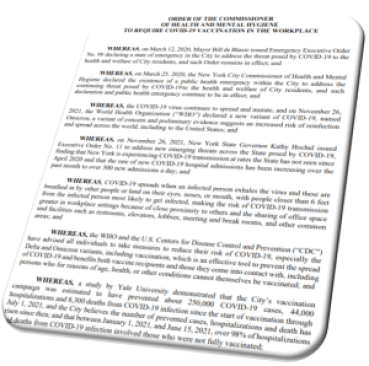For those of you with establishments in New York City, note that this week, Mayor Bill de Blasio and the New York City Commissioner of Health and Mental Hygiene issued a private employer vaccine man date, and yesterday published this implementation guidance for employers.
date, and yesterday published this implementation guidance for employers.
The key provisions of the mandate include:
1. Beginning December 27, 2021, workers must provide proof of vaccination against COVID-19 to a covered entity before entering the workplace, and a covered entity must exclude from the workplace any worker who has not provided such proof, unless they are provided an accommodation for a disability or religious reason.
-
- “Covered entity” means:
- a non-governmental entity that employs more than one worker in New York City or maintains a workplace in New York City; or
- a self-employed individual or a sole practitioner who works at a workplace or interacts with workers or the public in the course of their business.
- “Worker” means an individual who works in-person in New York City at a workplace. Worker includes a full- or part-time staff member, employer, employee, intern, volunteer or contractor of a covered entity, as well as a self-employed individual or a sole practitioner.
- Worker does not include:
- an individual who works from their own home and whose employment does not involve interacting in-person with co-workers or members of the public;
- an individual who enters the workplace for a quick and limited purpose (such as to use the bathroom, make a delivery, or clocking in and receiving an assignment before leaving to begin a solitary assignment); or
- non-City residents who are performing artists, college or professional athletes, or individuals accompanying such performing artists or college or professional athletes who do not have to display proof of vaccination pursuant to the Key to NYC program, Emergency Executive Order No. 316 and successor Orders.
- Worker does not include:
- “Workplace” means any location, including a vehicle, where work is performed in the presence of another worker or member of the public.
- “Proof of vaccination” means one of the following documents demonstrating that an individual has (1) been fully vaccinated against COVID-19; (2) received one dose of a single-dose COVID-19 vaccine; or (3) received the first dose of a two dose COVID-19 vaccine, provided that a worker providing proof of only such first dose provides proof of receiving the second dose of that vaccine within 45 days after receiving the first dose:
- A CDC COVID-19 Vaccination Record Card or other official immunization record from the jurisdiction, city, state, or country where the vaccine was administered, or from a healthcare provider or other approved immunizer who administered the vaccine, that provides the person’s name, vaccine brand, and date of administration. A digital photo or photocopy of such record is also acceptable.
- New York City COVID Safe App showing a vaccination record;
- A valid New York State Excelsior Pass/Excelsior Pass Plus;
- CLEAR Health Pass; or
- Any other method specified by the Commissioner as sufficient to demonstrate proof of vaccination.
- “Covered entity” means:
2. Workers in New York City who perform in-person work or interact with the public in the course of business must show proof they have received at least one dose of a COVID-19 vaccine by December 27th.
-
-
-
- Workers will then have 45 days to show proof of their second dose (for Pfizer or Moderna vaccines).
-
-

